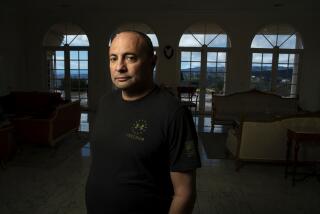Residence Permits Bring a High-Rise Price: $840,000 : Soviet Union: Two in Moscow pay 1.5 million rubles for the privilege at an unprecedented auction. And that does not include a dwelling.
MOSCOW — One and a half million rubles.
That astronomical sum--about $840,000 at the inflated commercial exchange rate--is what two out-of-towners agreed to pay for a Moscow residence permit Saturday at an unprecedented auction, the results of which proved eye-popping even for these topsy-turvy times.
The million and a half rubles--5,000 times the average Soviet monthly salary--did not buy an apartment, mind you, but merely the right to live in this overpopulated, under-supplied capital of 9 million.
“It’s absolutely absurd!” one initially hopeful bidder in the auction’s audience said in disgust when the 1.5-million-ruble starting price was announced. Ten people of the 50 or so gathered in the hall of the city’s Main Directorate for Planning, Control and Distribution of Housing walked out in a huff.
But after a long, painful pause, a dark-haired, plumpish woman raised her lavender number card. When asked later, she refused to give her name, saying only: “There was just no other way. We beat our heads against the wall for years.”
With glee, auctioneer Arseny Lobanov, dapper in purple bow tie and shiny gray jacket, banged his hammer and announced: “For the first time in the history of Moscow, a residence permit has been sold! For a million and a half rubles!”
It was a bewildering scene, typifying the distorted market that rules during this crossover period in Soviet economic reforms, when tremendous shortages and bureaucratic tangles often send the few prices that have been freed sky-high.
The permit auction also exemplified the oddities that arise as Soviet society shifts from totalitarianism to Western-style freedoms.
Officials almost universally admit that the propiska , or residence permit, is an odious remnant of Josef Stalin’s dictatorship that violates world human rights standards on freedom of movement and prevents the free flow of labor that a market-driven economy needs.
It has to go, they say. But not just yet.
The Moscow City Council shares Muscovites’ worries that the city will be swamped with provincials and rendered simply unable to provide them with basic services. Instead, it decided to keep the restrictive old system but squeeze it for funds to help the city budget.
With the price of one propiska , officials say, the city can build a nine-story building to ease the drastic shortage that is confining hundreds of thousands of Moscow residents in dormitories and cramped communal apartments.
“This is a very brave decision of the Moscow government,” said Nikolai Morozov, one of the organizers of the auction.
The second residence permit went to Sergei, director of a knitting factory that employs about 100 workers, who declined to explain how his firm had found a million and a half rubles to burn.
Sergei, who would not give his last name, had tried every other method, he said, and could no longer tolerate being registered to live in Obninsk, a small city about 70 miles away, when all his work is here.
Grigory, his companion, denied that black market money was the likeliest source of the price of the propiska . “Black marketeers already bought everything they needed long ago,” he said.
Strangely enough, having just agreed to shell out the equivalent of more than 400 years’ salary for an average worker, Sergei said he had no particular complaints about the propiska system.
“It should be freer, I suppose,” he said, but “we’ve lived this way a long time. We’re used to it.”
Lobanov, the auctioneer, also saw nothing strange in selling off the right to live somewhere.
“If an organization wants to bring someone in from Irkutsk, let them pay for it,” he said.
But a member of the auction audience nearby commented that it would have been a whole lot cheaper for Sergei to shell out 30,000 rubles--the going rate--to a woman who would agree to become his wife long enough for him to qualify for a propiska .
And Alexander Gonchar, director of a research firm that specializes in ecology, found a million and a half rubles simply out of reach.
Irina Zinchenko, the engineer he had wanted to buy the propiska for, lost out.
As things stand, she is registered in a town an hour and a half from Moscow and has to rent an apartment on the black market in the city. Aside from high rental prices, that means that she lacks the key privileges a Moscow propiska provides: the right to a card that would enable her to buy in Moscow’s shops and ration cards for sugar.
She and her company have tried to buck the bureaucracy to get a residence permit, she said, but have been stymied at every turn--to the point that “we had the impression they were just waiting for a bribe.”
For all the grumbling about prices and the eight propiskas that went unsold, the auction’s organizers said they believe it will prove to be the first of many, just as auctioning off apartments has become common in Moscow. Several were sold Saturday as well, for the royal sums of about 600,000 rubles--$330,000 at the commercial exchange rate--for two rooms a 40-minute ride out of town.
The Soviet ruble is not freely convertible on world money markets, and its rates vary according to the type of transaction. Although the rate for business deals is 1.8 rubles to the dollar, tourists can change their dollars at a rate of 30 to 1, making Soviet domestic prices absurdly cheap.
Even using the tourist rate, however, according to which a loaf of bread costs about 2 cents, the small apartments sold Saturday would run $20,000.
More to Read
Sign up for Essential California
The most important California stories and recommendations in your inbox every morning.
You may occasionally receive promotional content from the Los Angeles Times.










